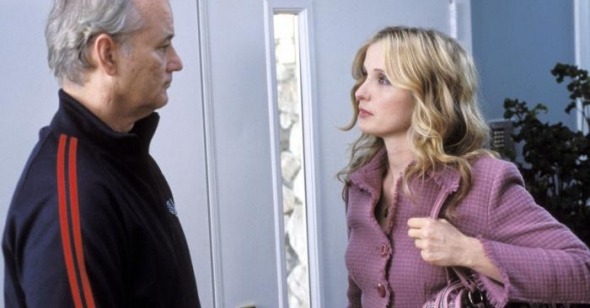It’s the Little Things
Kristi Mitsuda on Broken Flowers
Jim Jarmusch’s steadfast commitment to the swings of an eccentric sensibility defines his output to such a degree that I can as easily understand why someone would hate his movies as love them, in the same way you either mesh with certain personalities or don’t. I happen to feel an affinity for his random wanderers, of whom his most recent, Bill Murray’s Don Johnston—the similarity of name and predilections to the legendary lothario mirthfully noted throughout—is perhaps the most unconsciously forlorn.
Left by his most recent lover, Sherry (Julie Delpy), in the first five minutes of Broken Flowers with the utterance, “It’s like I’m your mistress, only you’re not even married,” we recognize Don’s type immediately: an aging bachelor, a bit of an ass, stunted by inertia. As per the rule in such cases, only an external force can push him towards personal evolution, and it arrives in the form of an anonymous pink envelope bearing a type-written letter informing him he fathered a son 19 years ago. He’s prodded by his friend, Winston (played by the splendiferous Jeffrey Wright), an aspiring sleuth so intrigued by the mystery of the mother’s identity he takes it upon himself to plan out Don’s entire trip down memory lane to visit the ghosts of girlfriends past.
The journey’s progression will not reveal answers but, in a manner specific to Jarmusch tales, lead further towards ruminative ambiguity and widening possibility, a space where despair commingles easily with hope. His deceptively concrete, observational style—the propensity for traveling shots intermixed with views from a static camera intact—is leavened by a characteristically elusive existential questioning. But while other films in Jarmusch’s oeuvre have remained floating in my consciousness for days afterwards, none touched me quite so deeply as Broken Flowers. This is a product of the film’s configuration, of course—who hasn’t wondered where a past love is now—which allows spectators to bring their own baggage to the viewing, but also speaks to the (dare I use such an easily maligned word?) maturity of its director, who finally allows for the expansion of underlying emotional terrain often precluded—but this time fostered—by a devout minimalism.
Situated firmly in the present with no recourse to flourishes like flashbacks or extended reminiscences, Don goes forth on his quest. Each knock on the door to an old flame brings only the slightest indication of former feeling. Since we’re given scant information to go on—limited to what we can infer through furnishings and the briefest of encounters—seeing what shimmers beneath the surface of Don’s interactions with his exes and sifting through the layers of suggestiveness becomes an absorbing activity more riveting than dramatic disclosure. You begin to unearth (or invent?) potential narratives for each woman, and it’s as much a credit to the uniformly excellent actresses portraying them as to the director how fertile this field is for sowing.
We flesh things out through subtle hints: The way Laura (Sharon Stone) curtly greets him until recognition hits, and a slow smile spreads across her face, fond memories dancing in her eyes; Don’s surprised delight when presented with a black-and-white photo featuring a flower-child Dora (Francis Conroy)—which he took—framed in her contrastingly modern prefab home; the guarded suspicion with which Carmen (Jessica Lange) considers his visit, a clear disruption in the mellowness of her new-age existence as broadcast by her practice as an “animal communicator, “ her loosely-wavy hair, and the floor cushion she sits on; the succinct fury of Penny (Tilda Swinton) cluing us in to long-ago betrayals; and the tenderness with which Don simply states, “Hey, beautiful,” and gently rests pink flowers on a dead girlfriend’s grave. In these flickering exchanges, a sadness—nostalgic or regretful—predominates and imparts more information about the characters than we expect.
Finding the answers to the swirling questions isn’t the point. We reach the end knowing no more about the “truth” than we did at the beginning. But the work has been done nonetheless; a turning point (visualized by the last shot) has been reached. And, as Jarmusch is so keen on pointing out, the journey is the destination.
